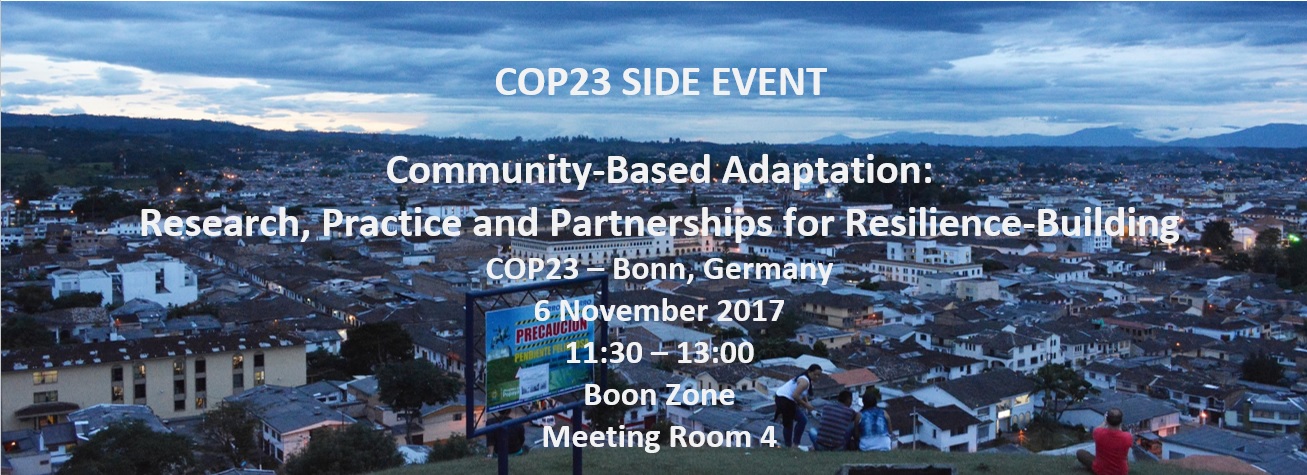On the first day of the COP23 I attended an interesting event that inspired me to write about how climate change can impact different people in different ways.
 According to research undertaken by Trocaire, there are a range of climate change impacts experienced by people in south eastern Kenya. These impacts are influenced by gender, age and disability.
Men usually own the land. With climate change, however, the productivity of the land is reduced, and is no longer able to support livestock or agriculture. People who depend directly on sensitive land resources are thus vulnerable to climate change impacts.
Young men do not own the land, so are forced to work in the land of their parents or move to towns for casual, low paid jobs. They have even less resources than their parents.
Women are usually more vulnerable to climate change in comparison to men. They are often poorer than men, are less educated, have less access to information and markets, have fewer resources, and are not able to make decisions about land management. These factors lower their ability to adapt to climate change impacts. Their roles and responsibilities, including reproductive roles, also reduce their ability to adapt.
Children are also sensitive to climate change impacts, and have low adaptive capacity. They can be impacted by a lack of food, which affects their health and capability to study. Girls spend extra time doing chores, such as collecting water, cooking, and taking care of siblings. In some cases they are forced to exchange sex for short-term gains, such as access to water, food, sanitary pads etc.
The elderly are particularly vulnerable to extreme weather conditions. They have reduced mobility, which limits their access to water, food, shelter, and medical care. Their lack of income also reduces their capacity to adapt to climate change.
Disabled people also suffer as a result of limited mobility; they need someone to assist them in accessing basic amenities such as food or water. Usually they are supported by their families, but their care often becomes less of a priority during droughts and extreme weather events,
According to research undertaken by Trocaire, there are a range of climate change impacts experienced by people in south eastern Kenya. These impacts are influenced by gender, age and disability.
Men usually own the land. With climate change, however, the productivity of the land is reduced, and is no longer able to support livestock or agriculture. People who depend directly on sensitive land resources are thus vulnerable to climate change impacts.
Young men do not own the land, so are forced to work in the land of their parents or move to towns for casual, low paid jobs. They have even less resources than their parents.
Women are usually more vulnerable to climate change in comparison to men. They are often poorer than men, are less educated, have less access to information and markets, have fewer resources, and are not able to make decisions about land management. These factors lower their ability to adapt to climate change impacts. Their roles and responsibilities, including reproductive roles, also reduce their ability to adapt.
Children are also sensitive to climate change impacts, and have low adaptive capacity. They can be impacted by a lack of food, which affects their health and capability to study. Girls spend extra time doing chores, such as collecting water, cooking, and taking care of siblings. In some cases they are forced to exchange sex for short-term gains, such as access to water, food, sanitary pads etc.
The elderly are particularly vulnerable to extreme weather conditions. They have reduced mobility, which limits their access to water, food, shelter, and medical care. Their lack of income also reduces their capacity to adapt to climate change.
Disabled people also suffer as a result of limited mobility; they need someone to assist them in accessing basic amenities such as food or water. Usually they are supported by their families, but their care often becomes less of a priority during droughts and extreme weather events,
 Brenda Vaccari is from Peru, and is currently studying a MSc Global Change Ecology at Universität Bayreuth, in Germany. Her main interests are climate change negotiations, ecosystems services, adaptation in the most vulnerable areas, and indigenous peoples. She expects to learn more in the future about negotiations and worldwide advances related to climate change, forests and people. She also loves hiking in nature.
Linkedin: https://www.linkedin.com/in/brenda-vaccari-paz-227b8244]]>
Brenda Vaccari is from Peru, and is currently studying a MSc Global Change Ecology at Universität Bayreuth, in Germany. Her main interests are climate change negotiations, ecosystems services, adaptation in the most vulnerable areas, and indigenous peoples. She expects to learn more in the future about negotiations and worldwide advances related to climate change, forests and people. She also loves hiking in nature.
Linkedin: https://www.linkedin.com/in/brenda-vaccari-paz-227b8244]]>